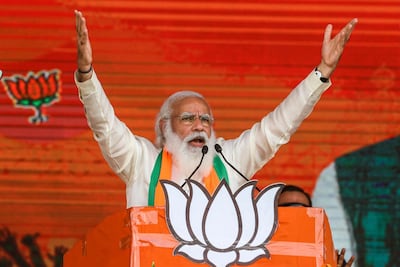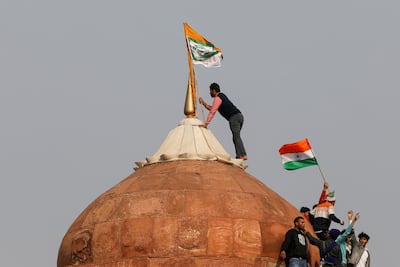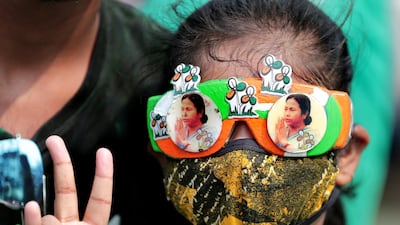Indian Prime Minister Narendra Modi’s Bharatiya Janata Party has suffered a series of landmark defeats in regional elections, setting the stage for a sea-change in Indian politics.
The election defeats have renewed hopes among political rivals of the Hindu nationalist leader that his rule is not invincible.
Mr Modi’s party lost three of the four state elections after polling ended last month as a wave of coronavirus infections exploded across the country.
The national crisis has triggered allegations against his government that it faltered in handling the deadly second outbreak.
In the key battleground of West Bengal, incumbent Mamata Banerjee held on to power while Modi's alliance partner in southern Tamil Nadu was ousted.
The Hindu nationalist party failed to win a single seat in southern Kerala state, where left wing parties won a historic re-election.
Political analysts blamed Modi’s defeat in West Bengal on his government’s abysmal management of the pandemic and the crisis unfolding in the country.
"Covid mismanagement definitely played a role in the BJP's defeat in the West Bengal assembly elections," Aarti Jerath, a political analyst based in Delhi, told The National.
“It fared dismally in the last three phases, which took place in the midst of a nationwide Covid surge.”
The only consolation for the ruling party was its victory in north-east Assam state and the federally controlled territory of Puducherry, where it retained power through an alliance of regional parties.
Mr Modi and his close aide, Home Minister Amit Shah, extensively campaigned in West Bengal, holding mega gatherings and roadshows to unseat Ms Banerjee, despite several parts of the country reeling under the pandemic.
There was jubilation on social media when the results were announced as critics of Mr Modi were furious with his mega rallies, that were attended by tens of thousands of people in the eastern state, even as desperate families in other parts of the country scrambled for oxygen beds and ICUs for Covid patients.
“Bodies are piling up in hospitals and crematoriums and people are not getting critical medical help in the form of hospital beds, medicines and oxygen, there is palpable public anger,” Ms Jerath said.
A win in West Bengal would have been a watershed moment for Mr Modi's BJP. The party has been trying to expand its reach in the eastern state that remained a centre of left wing politics for more than three decades before Ms Banerjee's Trinamool Congress defeated the Communists in 2011.

BJP had claimed it would sweep the state and had used all its might to unseat the two-time state leader.
The massive defeat of Mr Modi's party is likely to embolden regional political parties in polls next year in seven states, particularly in Uttar Pradesh, coastal Goa, and the prime minister's home state of Gujarat.
“The results have proved that despite having all the machinery and technology at their disposal, Modi-Shah are not invincible,” Shiv Sena party, Mr Modi’s political rival in western Maharashtra state, said in its official newspaper.
The most populous state Uttar Pradesh is also India's most crucial political state as it sends the maximum number of representatives to the lower house of the Parliament, shaping the narrative of Indian politics.
In 2017, BJP decimated the two strong regional parties – the Bahujan Samaj Party and the Samajwadi Party – and appointed Yogi Adityanath, a firebrand Hindu monk as the chief minister.
The state government has since passed several controversial laws, including banning beef and most recently, a law to safeguard Hindu women from marrying Muslims and Christians.
The government enjoys strong support in the state that has a long history of polarisation on religious lines and caste identity but experts say Mr Modi’s recent defeat, coupled with the ongoing farmer agitation against new farm laws, will decide the future of his party in the state.

Since November last year, tens of thousands of farmers from Punjab, Haryana and Uttar Pradesh have been protesting in tent cities on key highways connecting capital New Delhi against new farm laws.
The impact of the protests is already visible on the party in the states, where BJP leaders are being ostracised by villagers.
“The BJP is in any case on the back-foot in UP where farmers are up in arms against the new farm laws," Ms Jerath said.
"Farmers' anger coupled with Covid mismanagement will be potent issues in a state that is crucial to the BJP's and Modi's national fortunes."
In Gujarat, the state that was already reeling under economic distress after weeks-long coronavirus lockdown last year, the resurgence of the infection has left the state in dire situation.
The wealthy state is reporting thousands of new cases each day and hundreds have died in the surge that has prompted reopening of defunct crematoria to cope with the deluge of funerals.
"The actions and inactions of the Modi government in the 2-4 months will shape up things for the future," Rahul Verma, a fellow at Delhi based think tank Centre for Policy Research, told The National.
“Indian voters are likely to take into account how the Centre and their state governments functioned to provide relief to them during tough times.”

